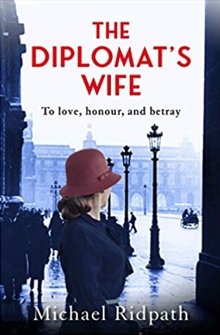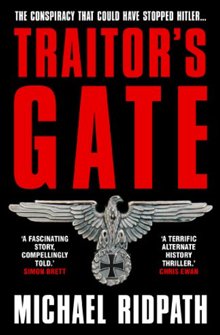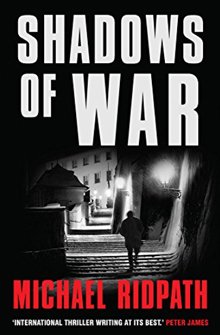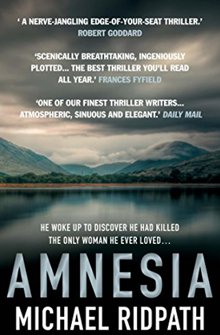Articles
Click on the links below to read the full article



Author Interviews

- Write about a period that you will enjoy finding out about, and inhabiting in your mind for a couple of years.
- Don’t be afraid to fictionalize some of the history. No one will mind as long as you make clear that’s what you are doing, and trying to wrangle real history into a tense plot structure is a nightmare.
- Write and rewrite and rewrite again. It’s in the rewriting that you will improve; if you don’t rewrite you won’t learn and you probably won’t be published.

 Traitor's Gate was your first foray into historical fiction, and you picked the eve of the Second World War and Nazi Germany. Why was that?After writing eight financial thrillers, I decided I wanted to do something new. A spy thriller intrigued me. I was intimidated by John le Carré and his Cold War thrillers, so I decided to try to seek out something less well known, either from the Second World War or just before. I stumbled across the plot to assassinate Hitler in September 1938, which I had never heard of. The more I read about it, the more fascinating I found it, especially when I read that Chamberlain knew about the plot, but chose to ignore it and do a deal with Hitler at Munich instead. The two years before the war are fertile ground for a spy writer. The stakes were high: war versus peace; Fascism versus democracy (or communism); Britain versus Germany. These divisions didn’t neatly overlap, leading to interesting conflicts for a novelist’s characters. My character Theo is a good German, hates Fascism but also hates war. Difficult for him – great for me.It was quite a long time in the writing, and drafting! Is that usual for your novels?Traitor’s Gate took by far the longest time to write of any of my books. I started writing in 2005 and the book wasn’t published until 2013. I wrote seven drafts. The first four were too historical and too slow. The fifth was fast-paced but had lost its colour and its heart. It was only when I put the book aside for three years that I was able to see that if I combined the best parts of the 2nd draft and the 5th draft I would end up with a fast-paced historical thriller. So it took a while, but I learned a lot.Whilst your main characters are fictitious, you conducted a huge amount of research into the novel, and much of the cast existed. How difficult was it to interweave these characters with real people?Extremely difficult. In retrospect, I included too many real people and events. The problem wasn’t so much writing scenes that followed history, it was being unable to change the scenes’ order. Pacing is important to me, and I frequently change the order of scenes and revelations in my book to make them more exciting. The trouble is you can’t change the order of real historical events!The von Fritsch affair was a key element in persuading many, particularly Admiral Canaris, to become more active in their opposition to Hitler and the Nazis. You’ve mentioned you included it in more detail in your first draft – did you remove it for space reasons?I included two interesting historical events in early drafts of the novel: one was the blackmailing of General von Fritsch by the Nazis, and the other was the German occupation of Vienna. They were good scenes, but they were not intrinsic to the thriller plot involving Conrad and Theo, and they both took place before June 1938. When I was trying to spice up my novel – the fifth draft - I decided that if I squeezed the plot into the three months June to September 1938 and cut these scenes out, the book would be a more exciting read. There is an old piece of advice to writers: “Kill your darlings.” Bye-bye Fritsch and bye-bye Vienna.We’re talking around the time of the new movie Munich about Chamberlain’s doomed attempt at appeasement. Although he may have been had a clear idea of what he wanted, surely the result of that approach was humiliation for Britain and France, and the shameful dismemberment of Czechoslovakia, and so surely should have seen this and supported the coup?
Traitor's Gate was your first foray into historical fiction, and you picked the eve of the Second World War and Nazi Germany. Why was that?After writing eight financial thrillers, I decided I wanted to do something new. A spy thriller intrigued me. I was intimidated by John le Carré and his Cold War thrillers, so I decided to try to seek out something less well known, either from the Second World War or just before. I stumbled across the plot to assassinate Hitler in September 1938, which I had never heard of. The more I read about it, the more fascinating I found it, especially when I read that Chamberlain knew about the plot, but chose to ignore it and do a deal with Hitler at Munich instead. The two years before the war are fertile ground for a spy writer. The stakes were high: war versus peace; Fascism versus democracy (or communism); Britain versus Germany. These divisions didn’t neatly overlap, leading to interesting conflicts for a novelist’s characters. My character Theo is a good German, hates Fascism but also hates war. Difficult for him – great for me.It was quite a long time in the writing, and drafting! Is that usual for your novels?Traitor’s Gate took by far the longest time to write of any of my books. I started writing in 2005 and the book wasn’t published until 2013. I wrote seven drafts. The first four were too historical and too slow. The fifth was fast-paced but had lost its colour and its heart. It was only when I put the book aside for three years that I was able to see that if I combined the best parts of the 2nd draft and the 5th draft I would end up with a fast-paced historical thriller. So it took a while, but I learned a lot.Whilst your main characters are fictitious, you conducted a huge amount of research into the novel, and much of the cast existed. How difficult was it to interweave these characters with real people?Extremely difficult. In retrospect, I included too many real people and events. The problem wasn’t so much writing scenes that followed history, it was being unable to change the scenes’ order. Pacing is important to me, and I frequently change the order of scenes and revelations in my book to make them more exciting. The trouble is you can’t change the order of real historical events!The von Fritsch affair was a key element in persuading many, particularly Admiral Canaris, to become more active in their opposition to Hitler and the Nazis. You’ve mentioned you included it in more detail in your first draft – did you remove it for space reasons?I included two interesting historical events in early drafts of the novel: one was the blackmailing of General von Fritsch by the Nazis, and the other was the German occupation of Vienna. They were good scenes, but they were not intrinsic to the thriller plot involving Conrad and Theo, and they both took place before June 1938. When I was trying to spice up my novel – the fifth draft - I decided that if I squeezed the plot into the three months June to September 1938 and cut these scenes out, the book would be a more exciting read. There is an old piece of advice to writers: “Kill your darlings.” Bye-bye Fritsch and bye-bye Vienna.We’re talking around the time of the new movie Munich about Chamberlain’s doomed attempt at appeasement. Although he may have been had a clear idea of what he wanted, surely the result of that approach was humiliation for Britain and France, and the shameful dismemberment of Czechoslovakia, and so surely should have seen this and supported the coup?
Hitler in the Sudetenland in 1938
 Michael Ridpath is the bestselling author of Free to Trade and Traitor's Gate which was published in 2013.
Michael Ridpath is the bestselling author of Free to Trade and Traitor's Gate which was published in 2013. 






